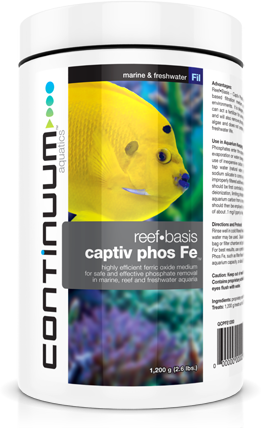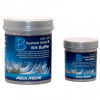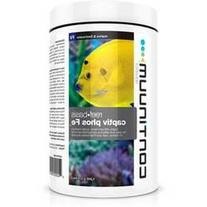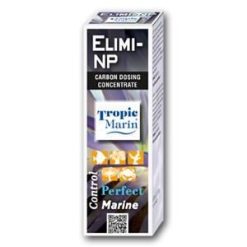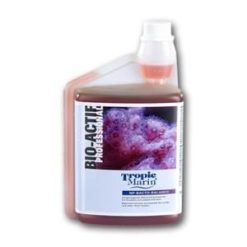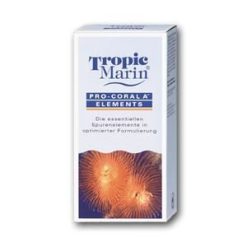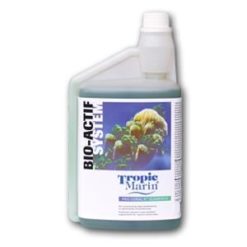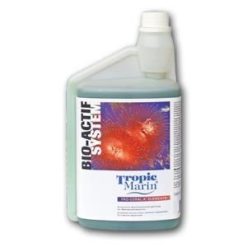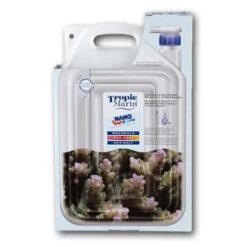captiv phos Fe
Highly efficient ferric oxide medium for safe and effective phosphate removal
in marine, reef and freshwater aquaria
in marine, reef and freshwater aquaria
The Continuum advantage.
Reef•Basis – Captiv Phos Fe is a supreme quality, granular ferric oxide based filtration medium particularly selected for sensitive aquarium environments. It is designed to remove free phosphates and silicates that can act as a fertilizer for unwanted algae or diatoms, directly from the water and will also remove phosphate bearing dissolved organics. It will not kill algae and does not contain any algaecides. It is safe for all marine and freshwater life.
Reef•Basis – Captiv Phos Fe is a supreme quality, granular ferric oxide based filtration medium particularly selected for sensitive aquarium environments. It is designed to remove free phosphates and silicates that can act as a fertilizer for unwanted algae or diatoms, directly from the water and will also remove phosphate bearing dissolved organics. It will not kill algae and does not contain any algaecides. It is safe for all marine and freshwater life.
Use in aquarium keeping.
Phosphates enter the aquarium primarily through tap water additions for evaporation or water changes, food addition, particularly brine shrimp, some other frozen foods and use of inexpensive carbon. Silicates enter the aquarium primarily through tap water (natural water contains silicates and water companies add sodium silicate to control equipment corrosion), poor salt mixes, and also improperly filtered additives made from tap water. Phosphates and silicates should be first controlled by the use of water made by reverse osmosis or deionization, limiting phosphate bearing foods and use of a good grade of aquarium carbon from a company you trust. Reef•Basis – Captiv Phos Fe should then be employed to reduce the phosphates that remain, to a level of .04 mg/l (ppm) or less.
Phosphates enter the aquarium primarily through tap water additions for evaporation or water changes, food addition, particularly brine shrimp, some other frozen foods and use of inexpensive carbon. Silicates enter the aquarium primarily through tap water (natural water contains silicates and water companies add sodium silicate to control equipment corrosion), poor salt mixes, and also improperly filtered additives made from tap water. Phosphates and silicates should be first controlled by the use of water made by reverse osmosis or deionization, limiting phosphate bearing foods and use of a good grade of aquarium carbon from a company you trust. Reef•Basis – Captiv Phos Fe should then be employed to reduce the phosphates that remain, to a level of .04 mg/l (ppm) or less.
Directions and protocol.
Rinse well in cold filtered freshwater, preferably RO or distilled water, but tap water may be used. Discard rinse water. Place loosely in a polyester filter bag or filter chamber and position to gently flow water through the medium or use in a fluidized bed filter. For best results, use a particulate prefilter ahead of the Reef•Basis – Captiv Phos Fe, such as filter floss or fine sponge. Use about 1 gram per gallon of aquarium capacity, or about 1/3 cupful per 100 US gallons (400 L).Clarion
Rinse well in cold filtered freshwater, preferably RO or distilled water, but tap water may be used. Discard rinse water. Place loosely in a polyester filter bag or filter chamber and position to gently flow water through the medium or use in a fluidized bed filter. For best results, use a particulate prefilter ahead of the Reef•Basis – Captiv Phos Fe, such as filter floss or fine sponge. Use about 1 gram per gallon of aquarium capacity, or about 1/3 cupful per 100 US gallons (400 L).Clarion
Caution: Keep out of reach of children. Not for human consumption. Contains proprietary activated ferric oxide, if ingested drink water. If in eyes flush with water.
